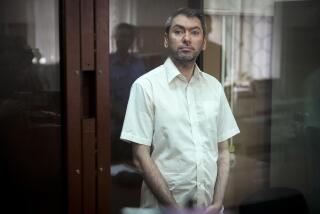Conservatives Could Roll Back Soviet Reform Drive, Sakharov Warns
- Share via
MOSCOW — Andrei D. Sakharov, the Soviet nuclear physicist and human rights activist, warned Friday that the process of political, economic and social reform in the Soviet Union is in danger of reversal because of conservative opposition.
Sakharov, winner of the Nobel Peace Prize in 1975, said he still places his hopes for the country’s future in Soviet leader Mikhail S. Gorbachev. But he said he sees Gorbachev’s reforms as being increasingly curtailed in compromises imposed on him by “reactionary forces” within the Communist Party leadership.
“I have the feeling that since May of this year, the development of perestroika (political and economic restructuring) has entered a very difficult period, almost a process of going backward,” Sakharov said.
Yegor K. Ligachev, who ranks second after Gorbachev in the party hierarchy and who has become the voice of conservatism within the leadership, is “a very dangerous, reactionary force,” declared Sakharov, 67. But, he added, “I do not think that he is the only dangerous figure.”
Sakharov, who now enjoys some official favor after a long period of internal exile, spoke to journalists at a reception in his honor at the U.S. Embassy following his induction as an honorary member of the American Academy and Institute of Arts and Letters.
Conservative Backlash
His downbeat assessment is shared by many Soviet liberals who have become increasingly concerned by the strength of the conservative backlash, reflected in articles in newspapers and journals restating orthodox positions. Some Soviet analysts, particularly economists, see the leadership torn by difficult choices that they must make soon on the country’s development strategy.
“There may just be a compromise between the pro-reform and anti-reform forces,” Sakharov said. “I hope that it is tactical and not a strategic change.”
He said it became apparent at the special party conference in June that “different interest groups in the Soviet Union, who still have power in their hands, are opposed to perestroika .”
He told the news conference, which was attended by some Soviet reporters, that he is particularly disturbed by recent “old-style” assessments in the Moscow media of the Soviet-led Warsaw Pact invasion of Czechoslovakia in 1968 and of the causes of World War II. These reflect an attempt by conservatives to force Gorbachev into an ideological retreat, he argued.
Some Soviet commentators, writing on the 20th anniversary of the Czechoslovak events, contended that the action was essential to prevent a reactionary takeover.
Czechoslovak Reforms
“The (reform) movement in Czechoslovakia in 1968 was a perestroika ,” Sakharov asserted, comparing it to the present reforms, particularly in the Baltic republics of Estonia, Latvia and Lithuania.
“It was a movement of the ordinary people, which included party leaders and broad strata of the intellectual community,” he said.
Among the other signs of retreat, according to Sakharov, are what he described as the dominance of anti-reform delegates at the June party conference and restrictions on newspaper and magazine subscriptions next year outside of major cities.
He said the subscription restrictions mean that the general public will have little access to “progressive publications” taking a strongly reformist line and promoting Gorbachev’s policy of glasnost , or openness.
“There is a risk that this will lead to glasnost being limited by geography and to certain elite social groups,” Sakharov said.
Questions Paper Shortage
He said he doubts the official explanation that the restrictions, bitterly criticized in many of the affected avant-garde publications, are caused by a paper shortage.
“This is certainly more likely a compromise between forces supporting and opposing reform,” he said.
Another sign of retreat, he argued, was Gorbachev’s failure to reach “a positive solution” on the future of Nagorno-Karabakh, the region in the Soviet republic of Azerbaijan where the majority Armenian population wants to join neighboring Soviet Armenia.
“This has been a big blow to perestroika and to the authority of its leaders,” Sakharov said.
U.S. Ambassador Jack F. Matlock Jr. presented Sakharov with the honorary membership in the academy, praising him as “one of the true heroes of our age.”
The American Academy and Institute of Arts and Letters is an honorary institution formed to promote art, literature and music in the United States. Its membership includes only 75 foreign artists, writers and composers.
More to Read
Sign up for Essential California
The most important California stories and recommendations in your inbox every morning.
You may occasionally receive promotional content from the Los Angeles Times.












